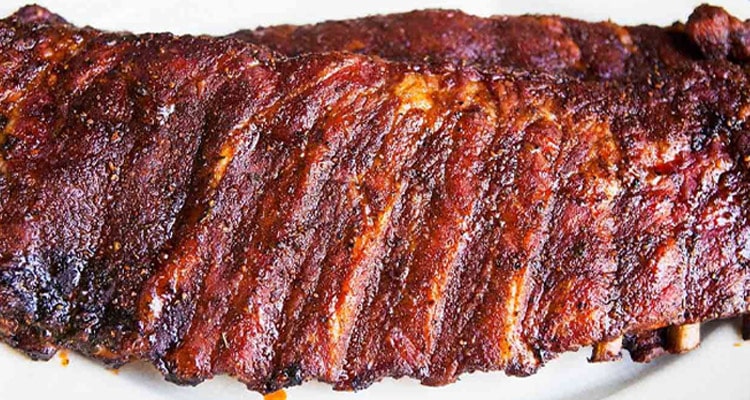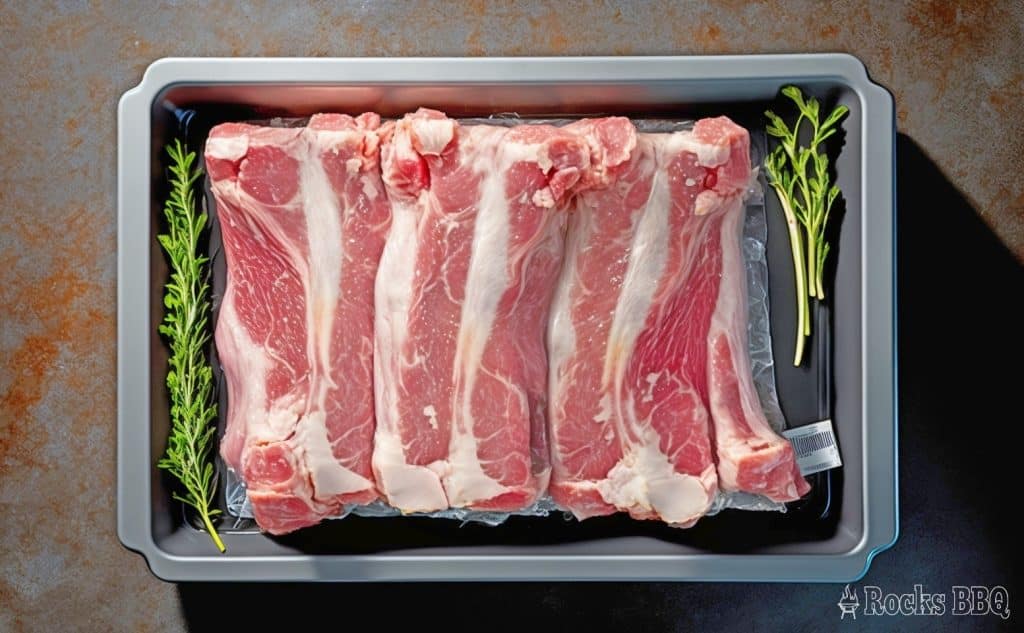
Knowing how long ribs are good in the fridge is crucial to maintain their mouthwatering taste and ensuring food safety. This comprehensive guide will walk you through the best practices for storing both raw and cooked ribs, covering essential details for beef and pork varieties. We’ve got you covered, from storage duration and tips to identifying spoilage.
Table of Contents
Storing Raw Ribs: Beef and Pork
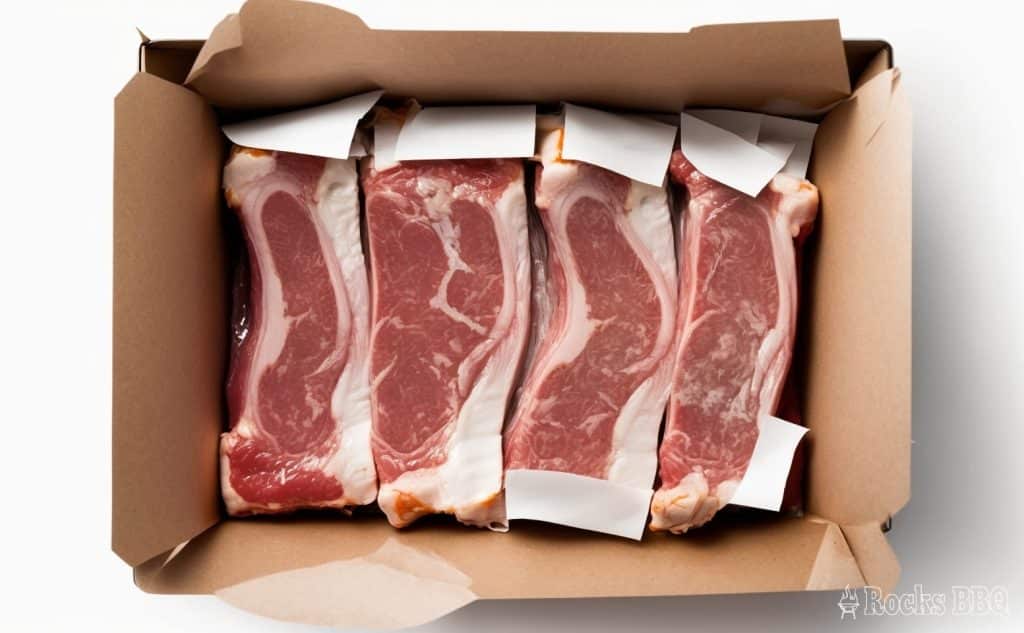
Beef ribs storage duration:
Fresh, uncooked beef ribs can be safely stored in the refrigerator for 3 to 5 days. Always pay attention to the expiration date and store the ribs at a temperature below 40°F (4°C) to ensure freshness.
Pork ribs storage duration:
Similarly, uncooked pork ribs can be stored in the refrigerator for 3 to 5 days. Make sure to check the expiration date and maintain a temperature below 40°F (4°C) for optimal freshness.
Uncooked ribs storage tips:
To store raw ribs in the fridge, follow these simple tips:
- Keep the ribs in their original packaging or wrap them tightly in plastic wrap or aluminum foil to prevent exposure to air.
- Place the ribs on a tray or in a container to prevent leaks or drips.
- Store the ribs on the bottom shelf of the refrigerator to prevent cross-contamination with other foods.
Signs of spoilage in raw ribs:
Detecting spoilage in raw ribs is essential to avoid consuming bad meat. Here are some indicators that your raw ribs have gone bad:
- Unpleasant or sour odor: If your ribs emit a strong, off-putting smell, they are likely spoiled.
- Slimy or sticky texture: When touched, spoiled ribs may have a slimy or sticky surface.
- Discoloration: If the color of the ribs has changed to a greenish or brownish hue, it’s a sign of spoilage.
- Expiration date: Always check the expiration date on the packaging, and avoid consuming ribs past this date.
Storing Cooked Ribs
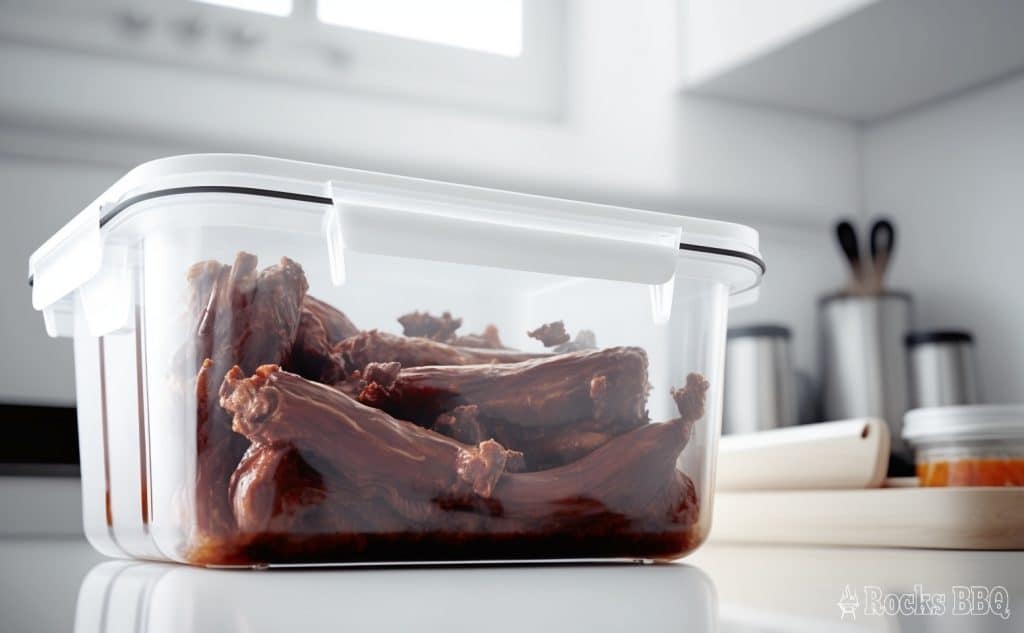
Cooked ribs storage duration:
Properly stored cooked ribs can last 3 to 4 days in the refrigerator. Consume leftovers within this time frame to ensure the best taste and quality. Remember to maintain a consistent temperature of 40°F (4°C) or below in your fridge.
Storing leftover ribs:
To properly store cooked ribs, follow these steps:
- Allow the cooked ribs to cool down to room temperature. Do not leave them out for more than 2 hours.
- Wrap the ribs in aluminum foil or plastic wrap, or place them in an airtight container to prevent drying out and protect them from contaminants.
- Store the ribs on a middle or top shelf in the refrigerator, away from raw meats to avoid cross-contamination.
Signs of spoilage in cooked ribs:
To recognize spoiled cooked ribs, look for these signs:
- Off-putting smell: A rancid, sour, or unusual odor strongly indicates spoilage.
- Mold: If you notice mold growth on the ribs, discard them immediately.
- Slimy texture: Cooked ribs that have become slimy to the touch are likely spoiled.
- Change in taste: If the ribs taste sour or off, they are unsafe to eat.
Reheating and consuming cold ribs:
Reheat leftover ribs in an oven, microwave, or on a grill to an internal temperature of 165°F (74°C) to kill any bacteria that may have developed. If you prefer to eat your ribs cold, ensure they were properly stored in the refrigerator and show no signs of spoilage before consumption.
Vacuum Sealing and Freezing Ribs
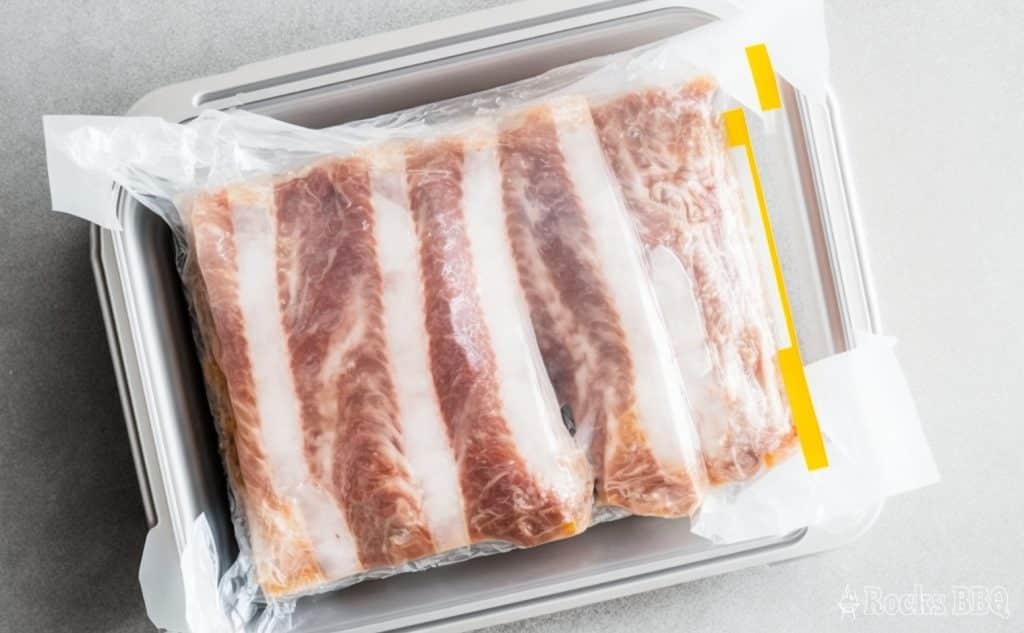
Vacuum sealing benefits for ribs storage:
Vacuum sealing offers several advantages when it comes to storing ribs:
- Extended shelf life: Vacuum sealing removes air, slowing the oxidation process and preserving the quality of the ribs for a more extended period.
- Prevention of freezer burn: By sealing the ribs in an airtight package, vacuum sealing helps prevent freezer burn and maintains the texture and flavor of the meat.
- Space-saving storage: Vacuum-sealed ribs take up less space in the freezer, making it more efficient for storage.
Freezing and thawing ribs safely:
Follow these steps to freeze and thaw ribs safely:
- Freeze raw or cooked ribs by vacuum sealing or wrapping them tightly in plastic wrap or aluminum foil, then placing them in a freezer-safe bag or container.
- Label the package with the date and type of ribs to keep track of their storage duration.
- To thaw ribs, transfer them to the refrigerator and allow them to thaw slowly (this may take 24 hours or more, depending on the size of the ribs). You can also use the cold water method or microwave, but avoid thawing at room temperature as it can promote bacterial growth.
- Once thawed, cook the ribs promptly or store them in the refrigerator for up to 3 to 5 days (raw ribs) or 3 to 4 days (cooked ribs) before consumption.
Duration of frozen ribs storage:
When adequately frozen and stored, raw beef and pork ribs can last for 4 to 6 months in the freezer without losing significant quality. Cooked ribs can be stored in the freezer for 2 to 3 months. However, consuming frozen ribs within the shortest possible time is always best for optimal flavor and texture.
Risks of eating spoiled ribs:
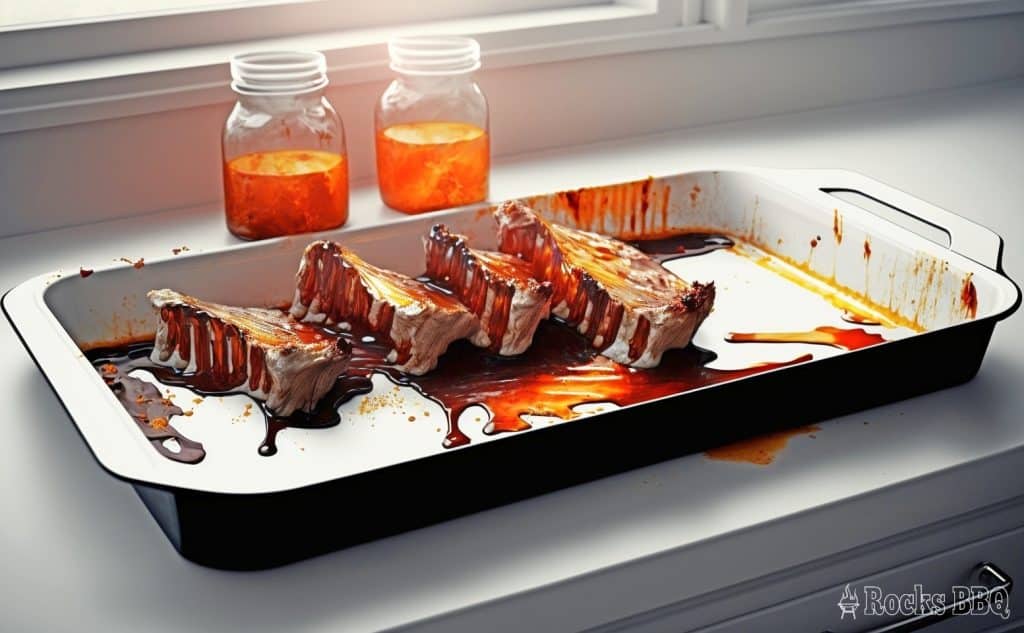
Consuming spoiled ribs can lead to food poisoning, which may cause mild to severe symptoms, depending on the individual and the type of bacteria present. Rotten meat can harbor pathogens such as Salmonella, E. coli, and Listeria, posing a severe risk to one’s health. To prevent food poisoning, always store and handle ribs properly, check for signs of spoilage, and avoid eating ribs past their recommended storage duration.
Food poisoning symptoms and causes:
Food poisoning can manifest in various symptoms, usually within a few hours to a few days after consuming contaminated food. Common symptoms include:
- Nausea
- Vomiting
- Diarrhea
- Abdominal pain or cramps
- Fever
- Fatigue
In severe cases, food poisoning can lead to dehydration, electrolyte imbalances, and even hospitalization. To minimize the risk of food poisoning, follow proper food handling and storage guidelines, cook ribs to a safe internal temperature, and discard any leftovers showing signs of spoilage. If you suspect food poisoning, seek medical attention, and stay hydrated to help your body recover.
Frequently Asked Questions
After thawing, beef ribs can be safely stored in the refrigerator for 3 to 5 days before cooking. Make sure to keep the temperature below 40°F (4°C).
It is not advisable to eat ribs stored in the fridge for 10 days, as they may have spoiled, increasing the risk of food poisoning. Cooked ribs should be consumed within 3 to 4 days.
Fresh, uncooked prime rib should be consumed within 3 to 5 days of storage in the refrigerator. Storing prime rib for 7 days may lead to spoilage and food safety issues.
Cooked rib leftovers can last for 3 to 4 days in the refrigerator when properly stored.
Store leftover ribs by cooling them to room temperature, wrapping them tightly in aluminum foil or plastic wrap, or placing them in an airtight container. Store them on a middle or top shelf in the refrigerator.
Store uncooked pork ribs in their original packaging or tightly wrapped in plastic wrap or aluminum foil. Place the ribs on a tray or in a container to catch any potential leaks and store them on the bottom shelf of the refrigerator to prevent cross-contamination with other foods.
Check for signs of spoilage, such as an unpleasant smell, slimy texture, discoloration, or mold. Also, ensure the ribs have been stored within the recommended time frame and temperature guidelines.
Raw pork ribs can last for 3 to 5 days in the refrigerator when appropriately stored at a temperature below 40°F (4°C).
Pork is good in the fridge for 3 to 5 days when stored at the correct temperature and in suitable packaging.
Storing pork in the fridge for a week is not recommended, as it may spoil and pose food safety risks. Consume pork within 3 to 5 days of refrigeration.
While pork can last 6 days in the fridge, consuming it within the recommended 3 to 5 days is safer to minimize the risk of spoilage and food poisoning.
Signs of spoiled pork include an unpleasant or sour smell, slimy or sticky texture, discoloration, or an expired expiration date on the packaging.
Yes, if the spare ribs are spoiled or have been improperly stored, handled, or cooked, they can cause food poisoning.
Consuming BBQ ribs that are spoiled, improperly stored, or undercooked can lead to food poisoning. Follow proper food handling and storage guidelines to minimize the risk.
Fresh, uncooked short ribs can last for 3 to 5 days in the refrigerator, while cooked short ribs can last for 3 to 4 days when properly stored.
You can eat leftover ribs cold, as long as they have been properly stored in the refrigerator and show no spoilage. However, reheating the ribs is recommended for improved taste and texture.
Vacuum-sealed pork ribs can last longer in the refrigerator than those stored in their original packaging, usually up to 1 to 2 weeks. However, consuming them within the shortest possible time is best for optimal quality.
No, you should not leave ribs uncovered in the fridge. Instead, wrap them tightly in plastic wrap, aluminum foil, or store them in an airtight container to prevent drying out and exposure to contaminants.
Conclusion
In conclusion, the proper storage of raw and cooked ribs is crucial for maintaining their taste, quality, and safety. By following the guidelines outlined in this article, you can ensure that your ribs stay fresh and safe to eat. Remember to store raw and cooked ribs separately, check for signs of spoilage before consumption, and adhere to the recommended storage durations. By prioritizing food safety and proper storage, you can enjoy delicious ribs while minimizing the risk of food poisoning.

